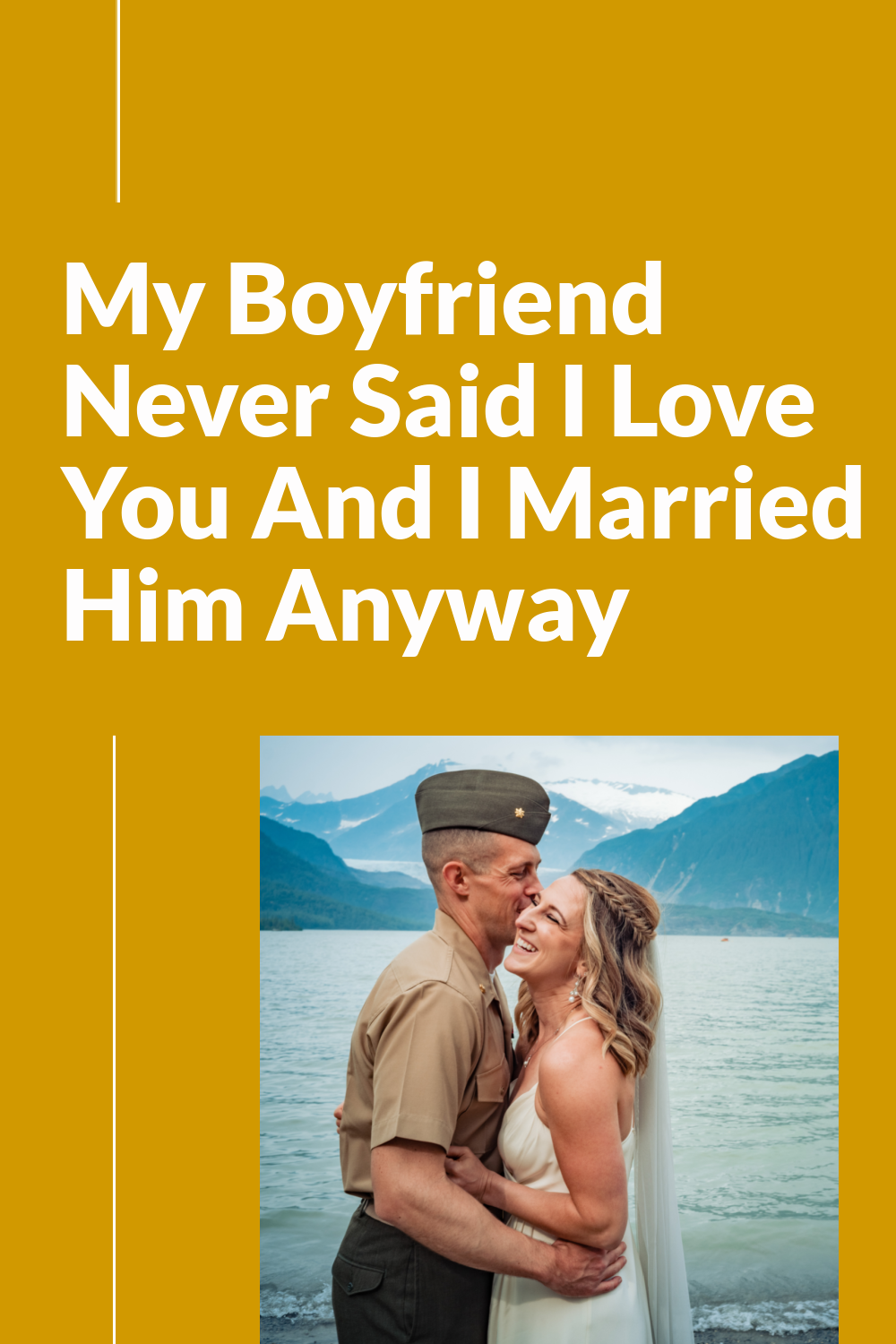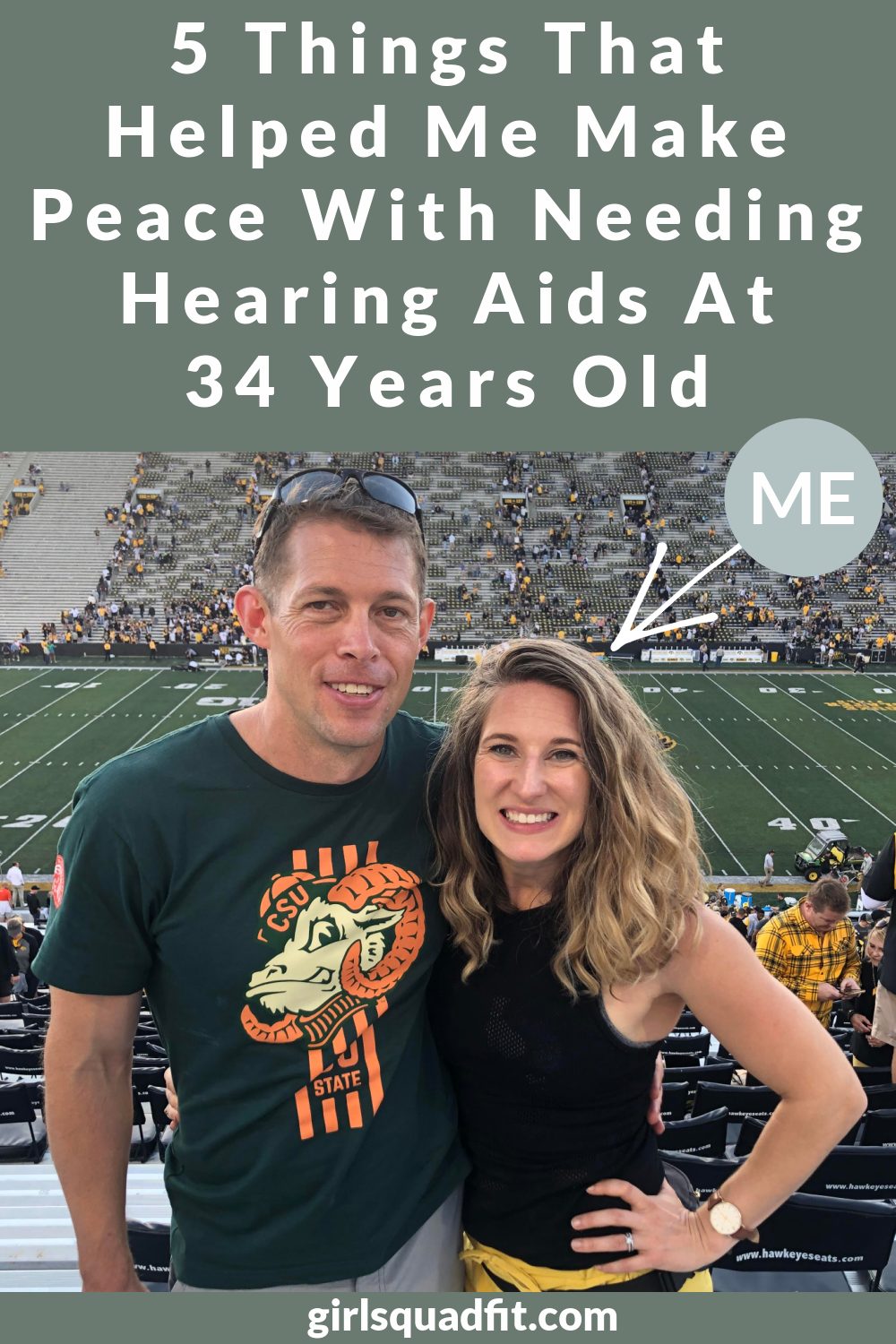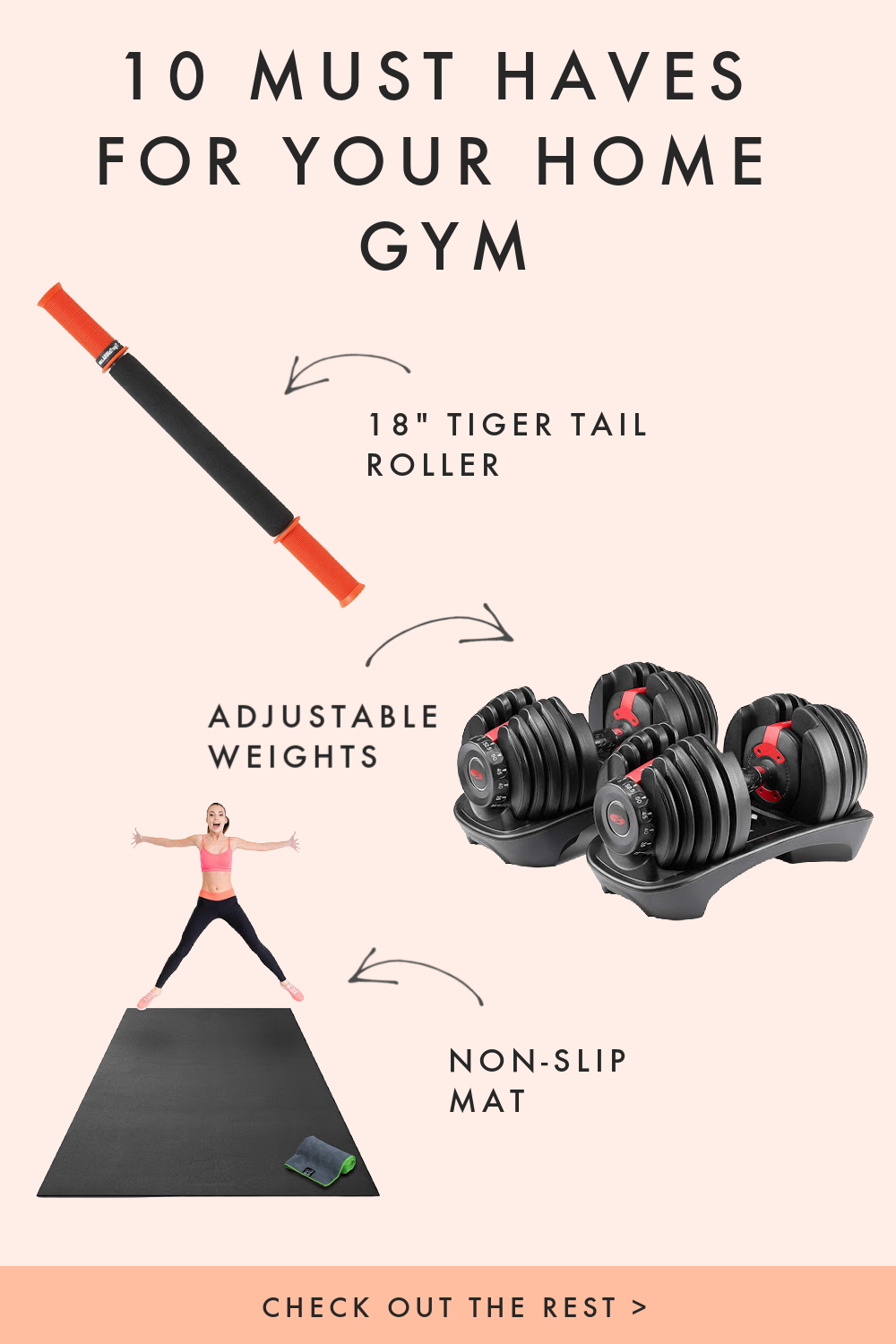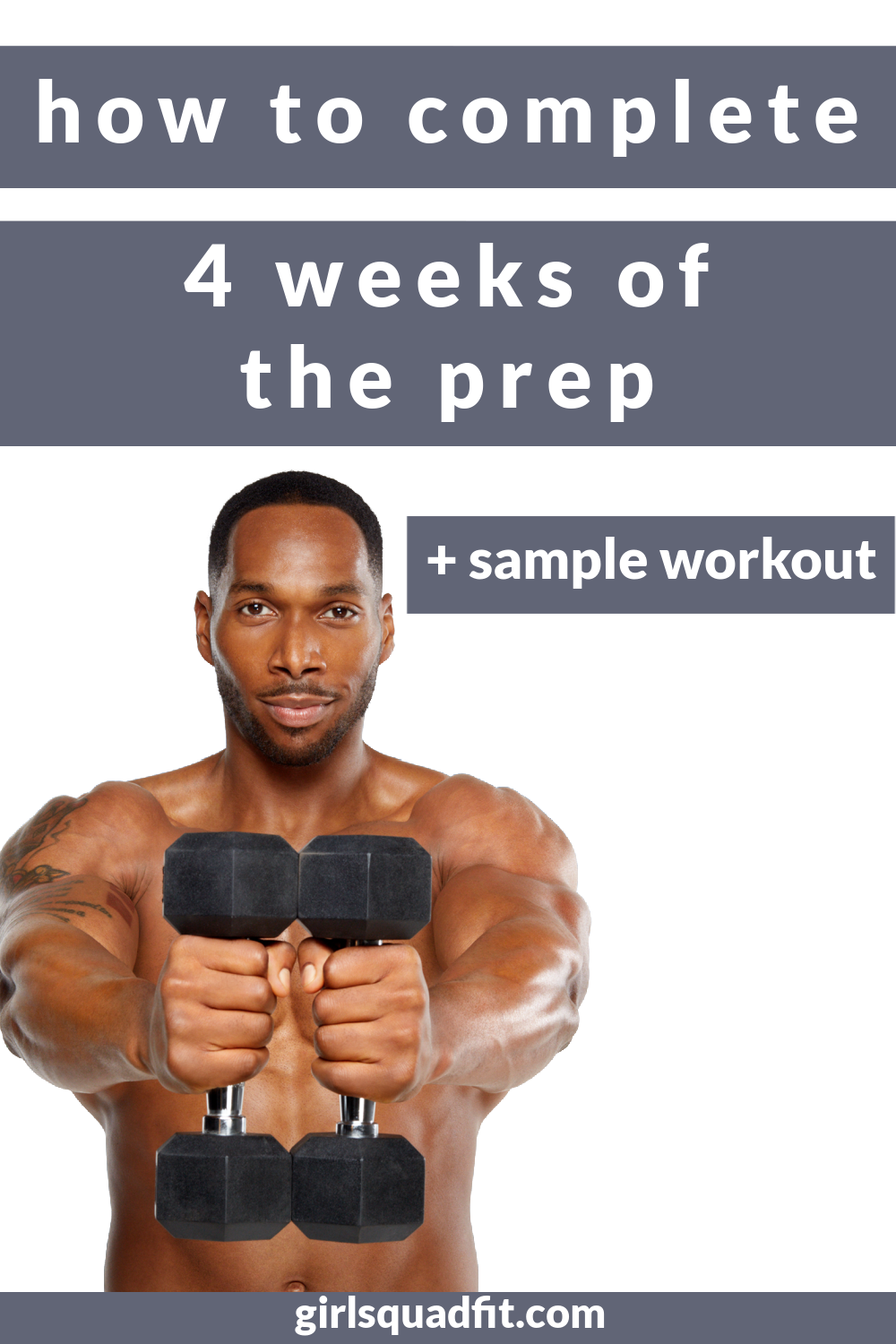This post contains affiliate links, please see my disclaimer for more information. Lauren is an independent team beachbody coach who co-runs The Girl Squad on the BOD app.
There are a lot of ways that a person can be loved and show love. In America, it’s often not culturally acceptable to be in a loving relationship without saying the words, “I Love You,” to each other. Here is my story of how I married my boyfriend even though he never said I love you and ways you can survive and even thrive in a relationship if your boyfriend won’t say I love you.
skip to the good stuff.
introduction to my love story
I’ve always wanted an epic love story to be the center stone of my life. When I dreamt of what my life would be like growing up it involved me being an independent adventurous woman who fell in love with a slightly mysterious man and whose love story was one for the ages.
I wanted that deep, soulful love that grounds you and makes you wake up each morning thankful for its existence in your life. The kind that surprises you, that makes you feel like magic lies in your bones.
The kind that makes you believe in miracles and live your life in a little more awe.
What I didn’t realize, is that just like every single chick flick that has ever been created, each great love story comes with its own brand of challenges to overcome.
Not to disappoint, my epic love story came with exactly that. In fact, in over 10 years I never once heard the words, “I Love You,” from my boyfriend, yet I knew this epic love story was meant to last.
This is a story for every single woman, who knew deep in their bones that even though their relationship was different, it was exactly what she wanted. For every woman who has ever been willing to fight for it, to learn about it, and to grow through it. And for every woman who wanted an epic love story that was different from everyone else’s.
Photo by Christian Lue on Unsplash
other people’s issues with us not saying
i love you
Somewhere along the way, every single American woman has learned that their relationship is doomed if they are not told “I love you,” within a society determined length of time.
That length of time is often arbitrarily determined by whoever is asking whether your significant other has said “those three little words yet.” I found that the length of time was often determined by when the person who was asking had been told, “I Love You,” for the first time by their current partner.
That human is using the only reliable data they have to determine whether your relationship is their definition of healthy. If their own deal breakers include hearing the words “I love you,” by six months, then they will look at your relationship in one of two ways.
They ask if your boyfriend has said I love you and you say “yep!”
They ask if your boyfriend has said I love you and you say “no,” “not yet,” or any other variation.
If you say yes, they will automatically think your relationship is perfect and maybe ask a follow up question to determine if your person said it around the same time their person did. This allows them to judge your relationship based on their experience with their relationship “working out.”
If you say no, they will likely ask how long you’ve been dating. If you answer in an amount of time less than how long it took their person to say “I love you,” you’re in the clear. They will determine automatically that your relationship still has hope.
If you say no and they ask how long you’ve been dating and it is determined that you have been dating longer than it took their person to say “I love you,” they will automatically think your relationship is doomed, your person isn’t treating you well, and you should dump their ass immediately.
The garbage part of this whole situation is no one knows it’s happening. Not you, the unsuspecting human who is just trying to mind your own business and not the person in a relationship who is subconsciously judging your relationship based on their experience and everything they’ve ever witnessed from hollywood.
They never tell you how long it took their person to say I love you in advance so you can just lie about how long you’ve been dating and avoid this entire disaster. And it took me nine actual years before I figured this out and started to switch the script.
If you’re like me and you have zero interest in having these type of judgey conversations, you might simply stop sharing details about your relationship with others because they just don’t get it.
I think; however, there may be a better way, which is why I’m writing this post that will likely get me a ton of DM’s in my messages and probably not be my husband’s favorite blog post in the entire world. Good thing he has an online alias #batman.
In essence, our friends come from a really loving place. They genuinely want you to have the same love they have. They want you to have the same experience with love that they have.
They are trying to use a ruler to help them understand whether the person you’re spending your time with is simply put “measuring up,” to the person they believe you deserve.
The problem with this, is every single person’s love story is different. People have different wants and needs in love. People have different priorities and they’re willing to make different compromises in order to live that epic love story of their dreams.
A specific set of rules determined by hollywood, is not necessarily the best way to go. People grow up with different experiences in childhood that also might make them have avoidance tendencies to things that the rest of us wouldn’t.
All of these need to be considered when you’re looking at a set of rules on which to determine if your friend’s relationship (or your own relationship) is the one in which they/you deserve.
Photo by pan xiaozhen on Unsplash
why we feel like we need to say I love you
In America, the traditionally accepted range in which you should say I love you to a partner is within three to six months. On top of this, we hear I love you all the time from our parents, our friends, and all the movies/shows we watch.
It has become common place in our culture as an expected milestone of every single healthy relationship.
We have, as a society, determined that it is a necessary step toward a stable, loving long term relationship.
It is again, the one measure from which we are told is exactly what we need in order to continue on this journey together, whether that journey ends in marriage or simply long term cohabitation.
Hearing I love you within three-six months seems radical to me, who has heard it once in twelve years, because within three to six months do you even really know your partner’s favorite movies or dessert? But that’s simply my experience clouding others' experiences in bias and judgement.
It took ten years for me to hear it, but if you hear it within three months does that actually mean anything other than your epic love story is different from mine? I don’t think so.
I think we’re all meant to have different experiences and if you hear it in three months, I’m happy for you girl, just don’t assume that someone who hasn’t heard it within the same timeframe doesn’t have just as epic a love story as you.
The biggest struggle with love both in the verbal sense and the relationship sense, is that it is the epitome of vulnerability.
And with vulnerability, it takes extreme amounts of courage to share those words — especially, since there is a very real possibility you won’t hear them back (at least right away).
If you are the first to say “I Love You,” you need to be prepared to hear a lot of things: Silence, Defensiveness, Fear, Shutting Down/Withdrawing, Dismissal, or potentially even an “I love you too.”
But the honesty of I love you, is that you need to be 1 million percent okay with your own feelings before you say it to someone else. Oftentimes women say, “I love you,” as a question instead of a statement.
This, in my very different opinion, can cause more harm to a relationship than good. Saying “I love you,” as a question is like asking “Do you love me?” but saying “I love you,” while waiting and needing a specific response of “I love you too.”
Women in this situation are looking for validation instead of expressing their feelings with courage in the face of fear of the unknown.
A relationship overall is such a complex experience. We are two different people with different pasts and different values and different lived experiences coming together to make a future. It takes time and a lot of work to understand how the other person thinks and views the world.
If you say “I love you,” but actually mean “do you love me?” You are setting yourself up for a very scary moment. If you say, “I love you,” based on the true and genuine feelings that you have, regardless of any or all outcomes, you are able to live life authentically with your whole heart.
It takes so much courage to be that person, though. How does one really get there?
They spend time learning about themselves, how they love, and what they need from a partner.
What’s more important than I love you
Often women are ready to say I love you before men are. And while it still seems wild to me, statistically speaking in a study of over 1k individuals, 55% of people said I love you within the first three months.
If you’re like me though, and I love you isn’t as common place in your relationship, how do you know that your relationship is still moving forward and stays healthy and loving?
The biggest thing that Psychologists say to use as a determining factor is how open and honest your communication is regarding the future.
For me, while saying I love you wasn’t something I heard — we talked frequently about our future. This is what women want most, isn’t it, when they say “I love you,” as a question of “Do you love me?” instead of as a declaration of love.
What we really want and need is the answer to this question, “Do you see a future with me?” “Is this relationship going in the same direction I want it to go?” “Are we on the same page?”
In my opinion, a better measure of a loving relationship than simply saying, “I love you,” is the honest and open communication that two people have on their vision of their shared future.
Do you want the same things? Are you willing to have deep, scary conversations about what your desires are knowing that your partner’s desires might be different. Are you willing to compromise and if so on what?
Rather than as a society putting all our eggs in the basket of “I love you,” shouldn’t we prioritize being brave enough to have vulnerable conversations on our visions for each of our lives and how we each fit into them more than three words that hold different meanings for different people.
lauren & #batman in September 2021 at the CSU vs Iowa Game
Our relationship without I love you
I met my now husband in a bar in California in 2009 at the young age of 22. I was on an Athletic Training internship with a Major League Soccer Team and he was stationed at Camp Pendleton as a 25 year old Marine.
our 20-something selves in the summer of 2009
As I write this, I am a 34 year old Marine Wife, and I have so much love for our baby 20-something selves. We lived life to the fullest, but we had so so much to learn about each other and relationships.
We met that summer and had a whirlwind romance -- the kind you find in only the most sappy romance novels mixed in with some dark Marine Corps humor. It was, and still is, my favorite summer of my life.
After two and a half months together, I moved back to finish my last year at the University of Iowa and he stayed in Southern California. Long distance for two twenty-somethings who hadn’t ever had a serious relationship before was fairly messy.
We had different communication styles (this is that foreshadowing moment where you’re like, “nooooo don’t open the door..”). I wanted to talk on the phone every night for 45 minutes and he hated the phone, but tolerated it in the beginning.
Long distance was rough and honestly we were so different that we didn’t understand each other enough to make it…
We weren’t honest about what we needed because we didn’t know enough about ourselves to be able to verbally communicate it to the other person.
We broke up after six months of dating because long distance was too much and #batman felt like the on-going phone calls weren’t sustainable.
We hadn’t said “I love you,” and while I had a lot to learn about #batman, I knew this: our break up phone call might be the absolute last chance I have to tell this man how much he means to me.
You see, Marines make decisions and they stick to them. I was 99% sure I would never talk to this man again, so I spent three hours telling him what a great human he was.
Wait, three hours? Yep, it still is shocking to me that both he stayed on the phone that long and that I had the nerve to do it.
I’m not sure if I actually said, “I love you,” but I said enough things that it was very evident that I cared about him deeply. I said everything his roommates had told me about him but had never told him themselves, like how much they admired the type of person he was.
As my heart was breaking into seven thousand pieces, I took this last chance to turn over every single last stone. I wanted to make sure I had no regrets and for this brilliant man to know how much everyone cared about him, even if they didn’t say it out loud.
After we broke up, a friend recommended the 5 love languages, a book based on different ways of giving and receiving love. I was in pretty bad shape, with a two-toned black/blonde mullet and reading was the one thing that helped me escape.
This book taught me so many things: the most important of which was that people love differently.
I took the quiz and realized I liked to receive love as quality time and physical touch but that I like to give love as physical touch and words of affirmation.
It helped me understand that #batman was acts of service and physical touch. This is why he sat on the phone with me every night even though it took so much energy out of him. It was also why long distance was brutal for both of us.
In the year that we broke up, we stayed in contact (much to my surprise and relief) and learned a lot about each other, how we communicate, what made each of us tick. When I moved back to California for graduate school (PT) we got back together.
In the next six years, through multiple international deployments including a year long deployment, communication became our keystone. After a while, I had said “I love you,” a few times and he hadn’t.
We ended up having a few conversations about why we didn’t say “I love you,” especially when friends would bring up “how weird it was,” and that it clearly meant our relationship was broken.
#Batman would always ask me, “do you feel like our relationship is broken?” or “does it bother you that we don’t say it?”
To which I would usually reply, “It only bothers me when other people bring up that we don’t say it and then they assume something is wrong with us because we don’t.”
Those conversations would always allow me to understand that we were both on the same page. I wasn’t worried about us not saying, “I love you,” because I FELT LOVED, every single day.
I did however, worry about other people’s opinions of our relationship. And when they brought it up, I didn’t have a good response to explain to them why it was okay that we didn’t say it.
Because here’s the thing I’ve learned:
People cannot understand what they have not experienced. They can trust you and your experience and respect where you’re at, but they cannot understand it.
being reunited after a year long deployment in 2015
If a friend believes that if you do not say I love you, in your relationship, that your relationship is less than a relationship that does say I love you -- you will not be able to change their mind that your relationship is good and healthy and loving.
Their belief is that a relationship must have “I love you,” in order for it to be healthy. Your relationship challenges that belief.
Therefore, they will not be able to understand your relationship. It’s like y = x where y is “i love you” and x is a healthy relationship.
They believe without y then x cannot exist.
Healthy relationships without I love you can exist, and as we know, relationships with I love you can also be unhealthy.
Those three words do not define a relationship’s health status, any more than those three words can guarantee that a relationship will last or be faithful.
Words cannot guarantee that, only people can.
Over time, I became more confident in our relationship’s differences and whenever women would bring up things that we did that were non-traditional and make it seem like our relationship was broken like “dating for ten years and not being engaged yet,” or “not saying I love you,” I would always end up feeling conflicted inside.
I would bring them up to my rebel boyfriend who loved living life differently and he’d help me see that it doesn’t matter what other people thought as long as I was happy with us, which I was (I mean, I would’ve gotten married a little sooner, but in the end, the timing was, actually, absolutely perfect - insert grateful eye roll emoji that doesn’t exist yet).
It was these conversations that we had with each other that helped me solidify my confidence in myself, our relationship, and that we were forging something together that was exactly right for us.
To be clear, I was fairly neutral on the whole “I love you,” thing. I hadn’t had a boyfriend say it before, and while it seems nice in theory -- for me, it’s most important to feel that love on a daily basis.
Since my number one love language is physical touch, I get more kisses than I would argue literally anyone on the planet.
If given the choice: kisses or I love you for the rest of my life, I’m picking kisses and hugs, because I believe in extra credit.
If you’re like, no Lauren, I probably get more kisses than you, I’m giving you a high five over here.
But just to be clear: I get morning kisses before coffee, kisses before work, kisses at home from work, and like 17 kisses before bed while we’re on the couch. Is it extravagant? Probably. Is it exactly how I want my epic love story to be, absolutely.
I struggled the most with the concept of belonging and how my relationship fit into belonging to myself, as a partnership, and to society as a whole.
The reason it bothered me so much when family and friends didn’t understand or accept that is was okay that we didn’t say “I love you,” was because I was putting a higher value on fitting in with them and society as a whole than I was on belonging to my relationship or to what my specific needs were as a partner in that relationship.
I wanted to fit in so much that it resulted in me questioning my relationship because it didn’t fit the mold of what was deemed socially acceptable ie a relationship where people said “I love you.”
Fitting in, as described by Brene Brown, is ““about assessing a situation and becoming who you need to be to be accepted. Belonging, on the other hand, doesn’t require us to change who we are; it requires us to be who we are.”
In order for my relationship to be accepted by most people, I had to either avoid the entire conversation of “have you said I love you yet,” or decide that it was more important for me to belong to myself and my relationship than it was to fit in with others, including my best friends.
Belonging is often a choice, it’s authentic, it feels scary but like you’re standing on solid ground -- even if that solid ground is the edge of a societal cliff.
Fitting in, often feels inauthentic, like you’re lying to yourself and others even if you aren’t exactly outright lying. You’re not being truthful in who you are or what you represent.
Belonging requires understanding who you are, what you value, what’s important to you and why. It requires introspection and open communication. It requires you to figure out your needs and determine if they are being met.
Photo by Amer Mughawish on Unsplash
Belonging is a journey and it requires you to put yourself and your needs first. It requires you to be true to yourself regardless of what others think of you. It requires you to be the truest, highest version of yourself.
It’s okay if you stumble along on that journey. I did. I had countless conversations that left me feeling like I was trying to fit in instead of owning my own belonging to myself and my boyfriend. Each time, those conversations felt awful to me -- but likely felt normal to the other person.
Why? Because they weren’t the ones trying to fit in, I was.
Living a life that is non-traditional asks a lot of you. It asks you to level up as a human. It asks you to be brave. It asks you to understand how humans work on a deeper level than anyone else.
But gosh, is it so worth it. I wouldn’t trade our rebel, nontraditional, don’t say “I love you,” but feel incredibly loved every single day relationship for anything else under the sun.
You see, I got that epic love story -- challenges and all, and it made me into a version of myself that I am so dang proud of. But of course, the story doesn’t end here. Because one time, #batman did say I love you, and it was pure Angelic magic.
The one time I heard I Love You.
I’ve heard a romantic partner say I love you only once in my entire life because when you ask God for an epic love story, it comes at you in all kinds of ways you don’t expect.
Through every single awkward conversation with people who didn’t understand us or our relationship, all the ups and downs of trying to meet in the middle with someone who didn’t see the value in marriage, and knowing that I loved an absolute rebel who needed to go down the path not even attempted let alone less traveled -- I held onto hope, faith, and the deep knowing that this was my once in a lifetime epic love story.
It wasn’t without struggle or fights or times where I pushed too hard and he pulled back. It wasn’t without deep practices of learning and trying and failing to figure out how we would communicate in ways that were gentle enough for the both of us.
Asking myself over and over again, how can we both get what we need here? What could I have done differently in this conversation to make it end better for the both of us?
And equal work on his end to understand me and express his needs in different ways so I could meet him in the middle.
We dated for eight years before we got married and ten years from the summer we first met. It wasn’t always clear either that we would make it, but we both held on, and we both built the foundation of our relationship brick by brick.
And sometime during that time I realized I wouldn’t hear I love you even if we eventually got married. That I had to be okay with marrying someone who strongly opposed saying it. Who felt it was overutilized and didn’t want to express his love for me in that way.
I consciously decided I was okay with never hearing it, that I could live an absolutely beautiful life without it. I made peace with never hearing it.
And then on a blissful July day, on the banks of Jeaneau, Alaska and the Mendenhall Glacier I heard, “I love you.” It was roughly a few minutes after our vows were said and we were announced as “Mr. and Mrs,” while everyone started lining up for pictures, that he whispered it in my ear.
At first, I was so shocked I almost didn’t say it back. But the surprise joy on my face was caught by our photographer and that moment is etched in my memory. I think in the end when I look at our story, this is what I see.
I loved him enough to trust that he loved me even without any specific words to prove it.
I looked for his love in a million different places and saw it in a million different ways. I was willing to build a life on our terms, meeting his needs in a way that meant a lot to him and he equally met my needs in a way that meant a lot to me.
I wanted to get married and he wasn’t always sold on the idea. He never wanted to say I love you and I met him there with open arms.
We built this life together, both our needs being met, in a way that is specifically and beautifully ours. And in the end, that is one hell of an epic love story in my book.
Cultural Differences with expressing love
Love is expressed differently in different cultures. In Japan, for example, there isn’t a specific phrase that designates a progress in a relationship’s status like how “I love you,” does in American culture.
The context in which Japanese culture shows love include phrases that are closest to “I like you,” “I adore you,” “I support you,” or “I can tell how hard you’re trying.”
In France, there’s less pressure surrounding dating according to a relationship coach, Adeline Bréon, but it also results in relationships moving quicker because they’re “all in,” from the beginning vs being casual as in the United States.
In China, there is a specific phrase that men say to women when they want to denote a relationship as exclusive. The phrase, “wo ai ni” will then result in a more intimate relationship and the relationship status of boyfriend and girlfriend.
In South Korea according to professor Stephen Epstein, Koreans do not say “I love you,” to partners or family members or at least did not until Western movies became more mainstream. Epstein explains that the “understanding is that the love is there; it just doesn’t need to be declared verbally the way Americans might.”
There are many different ways to say “I love you,” or to share that you support a romantic relationship and the cultures around the world all do it differently.
If your partner struggles with the specific phrase I love you, check out the tips below to see if some of the suggestions could help you find a closer match to hear love as well as feel it in your relationship.
6 Tips if you haven’t heard I love you yet
or have a partner who struggles with saying
“I love you.”
Determine if hearing “I love you,” is an absolute need for you.
If you are someone who receives love via “words of affirmation,” hearing I love you might be an absolute need for a healthy relationship. This is 100% fine.
I’ll be honest when I say, if words of affirmation had been higher on my needs list, I’m not sure that not hearing I love you would’ve been a compromise I was willing (or able) to make.
If you determine that “I love you,” is absolutely a must for you, be honest with your partner and see if they are willing to say it when they’re ready -- heck they might be more scared of saying it than you are :)Come up with your own phrase.
If you have a partner who struggles with the specific phrase “I love you,” or is a total rebel who refuses to partake in things that society has arbitrary expectations on -- come up with your own phrase that means something to the two of you.
In our life I still like giving love via words of affirmation. Because I know “I love you,” isn’t #batman’s preferred means of receiving love I don’t say it all that often, if at all (I’m talking maybe once over a few years).
Things I do say all the time include, “We have an amazing life,” “I love this life we’re creating together,” and “You’re my favorite.” Come up with a few phrases of your own, they can totally include the word love but maybe in a different tone or style than specifically “I love you.”Show appreciation on the daily.
I think one thing we could do better at as humans in general is expressing our appreciation for the things people do to help us, even if they’re small and seemingly insignificant.
Feeling appreciated is a really close feeling to feeling loved. It’s also a really great bridge builder if you’ve just gotten into a fight.
One of my favorite habits that we do as a couple is saying Thank you at the end of the night for something the other person does. “Thank you for loading the dishwasher tonight,” “Thank you for telling me what you needed even though it was difficult,” “Thank you for reminding me to take out the frozen meat for dinner tomorrow night.”
Saying thank you, especially right before bed, can remind the other person that they are appreciated by you and also allow them an opportunity to appreciate you. It’s best though, if you say Thank you without the need to hear it back, otherwise it kind of defeats the purpose.Prioritize communication about the future and other vulnerable topics.
It amazes me how many people gave me shit about not saying “I love you,” in my relationship but then struggle to talk with their partners about life altering vulnerable conversations like money.
While in our relationship, we don’t say I love you and we do talk about money and sex and our future all the time. I feel as though we are on the same page, because we talk about the book we’re writing together, and the needs that each person has in regards to those specific topics.
Even when it’s scary, even when I felt like #batman was way better at money than me, even when I thought my $151,000 of student loans were a deal breaker for him to marry me. We talked about it all.
We open our personal capital apps and talk about our money and our debt and our messy closets because those are life altering, vulnerable aspects of our life that dictate our future together.
Saying I love you is great, but don’t let it be a cozy quilt that you put over life to shield you from having deep, meaningful, sometimes scary conversations.Read the five love languages and then read it again.
Have your partner take the quiz, even if they make you sub out the word “love,” for another “L” word and it makes reading the questions awkward and funny but still kind of painful.
If they refused to take the quiz, answer what you think they’d say and then tell them you think they’re a “xxx” for love language. Sometimes, people who refuse to take quizzes equally hate when people “tell them what they are.” It’s a slightly sneaky way to get them to be more open to answering the questions for themselves.
This book most literally saved our relationship. I am fully convinced that if a friend had not given it to me when we were broken up our second attempt at a relationship would’ve been just as messy as the first. But because I read it, I had better strategies, a better framework, and a few pieces of gold knowledge to help us communicate better and to see #batman and the way he loved me in a different light than I did before.Decide what your own boundaries are.
It’s okay to break up with someone if they aren’t able to say “I love you,” and it is something that is vitally important to you. It’s okay to be honest with someone that hearing “I love you,” is a way for you to feel loved and that when you don’t hear it, you feel less loved.
It’s important to voice your needs, regardless of whether or not someone is able to meet them. It shows that you are valuing YOU above all. You can then make choices based on whether or not the other person can meet those needs.
It’s okay to give someone a chance and some time to meet those needs and then make a decision on whether or not it was what you needed. It’s okay to revisit the conversation again and remind the person that this is something that is important to you.
When someone has a need that is important to them, but it’s not something that is important or even honestly on the other person’s radar, it can be easy for the partner to forget and unintentionally hurt the other person.
Think of it like remembering what time the football game is on or even that it is football season. If football is important to you, you’re going to remember the game or at least remember to look it up.
If football is not important to you, you’re going to need reminders to even think about it. I think this is how men’s minds work -- I don’t think they’ve been conditioned to need to hear “I love you,” like women have, so they forget. Side note: I do think they need to hear it though, even though the world has told them it’s okay to function without hearing it.
If this is something that is vitally important to you, like the air you breathe, you need to remind your partner, just like they remind you not to schedule things for football games :)
How do you know if you can have a relationship without I love you.
Every single person’s relationship is different and if you take away anything from this blog post, please let it be that.
It’s just as okay if you need to hear “I love you,” as it is if you choose to live an entire happy marriage without ever saying it.
What matters is deciding what is important to you. Deciding how you want to belong to yourself and your relationship.
What kind of a relationship is important to you?
I wanted an epic love story. I wasn’t as concerned about the details as long as it was deep and soulful and full of adventure and hugs.
And that is exactly what I got.
Did I anticipate my love story being one that totally omitted the phrase, “I love you,” from its existence. Not quite. But am I okay with it? One million percent.
So, if you’re choosing to live life a little differently in a way that is beautiful and full of belonging to your vision -- this blog is for you…
A reminder that we can actually have it all, as long as we’re willing to decide what “it all,” is.
“it all,” is an epic love story surrounded by people who love me and accept our wild, nontraditional life without question.
AUTHOR: Dr. Lauren Baker, DPT, PT, ATC, MTC is a Physical Therapist & Certified Athletic Trainer, Online Fit Coach, Self-Published Author & Military Wife who has been trying to run away to the circus since 2012 & does aerial in between her home workouts.
She is obsessed with sharing her journey, adventures & knowledge so that you know that literally, ANYTHING is possible with a little bit of Google & a WHOLE lot of courage.
Don’t Miss Out On Free Stuff!
Have you checked out the free library yet?
I’m kind of obsessed with creating pdfs and free guides so make sure you’ve checked it out before you go. I’m always adding new stuff, so if it’s been awhile make sure you log back in!




































